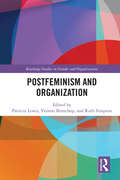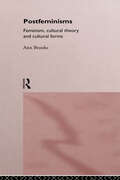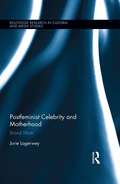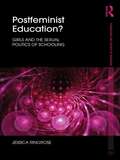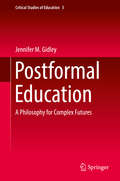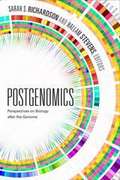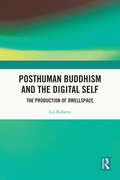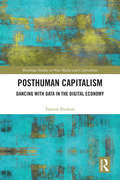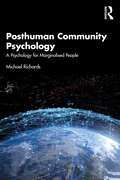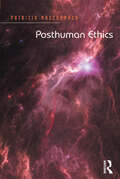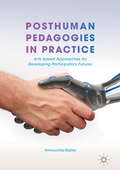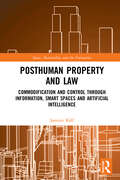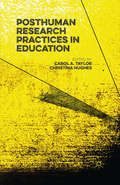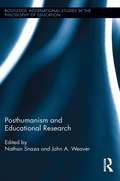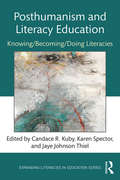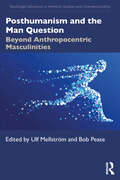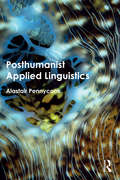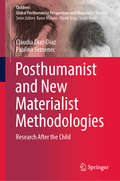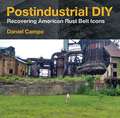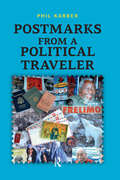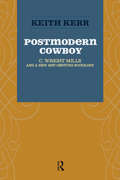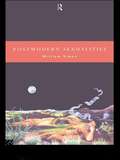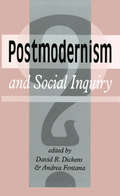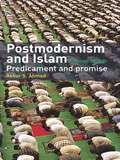- Table View
- List View
Postfeminism and Organization (Routledge Studies in Gender and Organizations)
by Ruth Simpson Patricia Lewis Yvonne BenschopThis edited book inserts postfeminism (PF) as a critical concept into understandings of work and organization. While the notion of PF has been extensively investigated in cultural and media studies, it has yet to emerge within organization studies - remaining marginal to understandings of work based experiences and subjectivities. Understanding PF as a discursive cultural context not only draws on an established epistemological orientation to organizations as discursively constructed and reproduced but allows us to highlight how PF may underpin and be underpinned by other discursive regimes This book, as the first in the field, draws on key international authors to explore: the contextual ‘backdrop’ of PF and its links with neo-liberalism, transnational feminism and other hegemonic discourses; the different ways in which this backdrop has infiltrated organizational values and practice through the primacy attached to choice, merit and individual agency as well as through the widespread perception that gender disadvantage has been ‘solved’; and the implications for organizational subjectivity and for how inequality is experienced and perceived. This book introduces postfeminism as a critical concept with contemporary importance for the study of organizations, arguing for its explanatory potential when: Exploring women’s and men’s experience of managing and organizing; Investigating the gendered aspects of organizational life; Analysing the contemporary validation of the feminine and the associated feminization of management/leadership and organizations; Tracing the emergence of new femininities and masculinities within organizational contexts. The book is ideal reading for researchers working in the area of Gender and Organization Studies but is also of interest to researchers in the areas of Cultural Studies, Media Studies, Women’s Studies and Sociology.
Postfeminisms: Feminism, Cultural Theory and Cultural Forms
by Ann BrooksOnce seen as synonymous with "anti-feminism" postfeminism i now understood as the theoretical meeting ground between feminism and anti-foundationalist movements such as postmodernism, post-structuralism and post-colonialsm. In this clear exposition of some of the major debates, theorists and practitioners, Ann Brooks shows how feminism is being redefined for the twenty first century. Individual chapters look at postfeminism in relation to feminist epistemology, Foucault, psychoanalytic theory and semiology postmodernism and postcolonialism, cultural politics, popular culture, film and media, and sexuality and identity For all students looking for guidance through the sometimes murky waters of contemporary feminist theory, this book wil provide a reassuring first port of call.
Postfeminist Celebrity and Motherhood: Brand Mom (Routledge Research in Cultural and Media Studies)
by Jorie LagerweyThis book analyzes the intersections of celebrity, self-branding, and "mommy" culture. It examines how images of celebrity moms playing versions of themselves on reality television, social media, gossip sites, and self-branded retail outlets negotiate the complex demands of postfeminism and the current fashion for heroic, labor intensive parenting. The cultural regime of "new momism" insists that women be expert in both affective and economic labor, producing loving families, self-brands based on emotional connections with consumers, and lucrative saleable commodities. Successfully creating all three: a self-brand, a style of motherhood, and lucrative product sales, is represented as the only path to fulfilled adult womanhood and citizenship. The book interrogates the classed and racialized privilege inherent in those success stories and looks for ways that the versions of branded motherhood represented as failures might open a space for a more inclusive emergent feminism.
Postfeminist Education?: Girls and the Sexual Politics of Schooling (Foundations and Futures of Education)
by Jessica RingroseThis book challenges a contemporary postfeminist sensibility grounded not only in assumptions that gender and sexual equality has been achieved in many Western contexts, but that feminism has gone ‘too far’ with women and girls now overtaking men and boys - positioned as the new victims of gender transformations. The book is the first to outline and critique how educational discourses have directly fed into postfeminist anxieties, exploring three postfeminist panics over girls and girlhood that circulate widely in the international media and popular culture. First it explores how a masculinity crisis over failing boys in school has spawned a backlash discourse about overly successful girls; second it looks at how widespread anxieties over girls becoming excessively mean and/or violent have positioned female aggression as pathological; third it examines how incessant concerns over controlling risky female sexuality underpin recent sexualisation of girls' moral panics. The book outlines how these postfeminist panics over girlhood have influenced educational policies and practices in areas such as academic achievement, anti-bullying strategies and sex-education curriculum, making visible the new postfeminist, sexual politics of schooling. Moving beyond media or policy critique, however, this book offers new theoretical and methodological tools for researching postfeminism, girlhood and education. It engages with current theoretical debates over possibilities for girls’ agency and empowerment in postfeminist, neo-liberal contexts of sexual regulation. It also elaborates new psychosocial and feminist Deleuzian methodological approaches for mapping subjectivity, affectivity and social change. Drawing on two UK empirical research projects exploring teen-aged girls’ own perspectives and responses to postfeminist panics, the book shows how real girls are actually negotiating notions of girls as overly successful, mean, violent, aggressive and sexual. The data offers rich insight into girls’ gendered, raced and classed experiences at school and beyond, exploring teen peer cultures, friendship, offline and online sexual identities, and bullying and cyberbullying. The analysis illuminates how and when girls take up and identify with postfeminist trends, but also at times attempt to re-work, challenge and critique the contradictory discourses of girlhood and femininity. In this sense the book offers an opportunity for girls to ‘talk back’ to the often simplistic either wildly celebratory or crisis-based sensationalism of postfeminist panics over girlhood. This book will be essential reading for those interested in feminism, girlhood, media studies, gender and education.
Postformal Education
by Jennifer M. GidleyThis book explains why the current education model, which was developed in the 19th century to meet the needs of industrial expansion, is obsolete. It points to the need for a new approach to education designed to prepare young people for global uncertainty, accelerating change and unprecedented complexity. The book offers a new educational philosophy to awaken the creative, big-picture and long-term thinking that will help equip students to face tomorrow's challenges. Inside, readers will find a dialogue between adult developmental psychology research on higher stages of reasoning and today's most evolved education research and practice. This dialogue reveals surprising links between play and wisdom, imagination and ecology, holism and love. The overwhelming issues of global climate crisis, growing economic disparity and the youth mental health epidemic reveal how dramatically the current education model has failed students and educators. This book raises a planet-wide call to deeply question how we actually think and how we must educate. It articulates a postformal education philosophy as a foundation for educational futures. The book will appeal to educators, educational philosophers, pre-service teacher educators, educational and developmental psychologists and educational researchers, including postgraduates with an interest in transformational educational theories designed for the complexity of the 21st century. This is the most compelling book on education I have read for many years. It has major implications for all who are in a position to influence developments in teacher education and educational policy. Gidley is one of the very rare scholars who can write intelligently and accessibly about the past, present and future in education. I was challenged and ultimately convinced by her contention that 'what masquerades as education today must be seen for what it is - an anachronistic relic of the industrial past'. Gidley's challenge is to 'co-evolve' a radically new education. All who seek to play a part must read this book. Brian J. Caldwell, PhD, Educational Transformations, former Dean of Education at the University of Melbourne and Deputy Chair, Australian Curriculum, Assessment and Reporting Authority (ACARA)
Postgenomics: Perspectives on Biology after the Genome
by Hallam Stevens Sarah S. RichardsonTen years after the Human Genome Project's completion the life sciences stand in a moment of uncertainty, transition, and contestation. The postgenomic era has seen rapid shifts in research methodology, funding, scientific labor, and disciplinary structures. Postgenomics is transforming our understanding of disease and health, our environment, and the categories of race, class, and gender. At the same time, the gene retains its centrality and power in biological and popular discourse. The contributors to Postgenomics analyze these ruptures and continuities and place them in historical, social, and political context. Postgenomics, they argue, forces a rethinking of the genome itself, and opens new territory for conversations between the social sciences, humanities, and life sciences.Contributors. Russ Altman, Rachel A. Ankeny, Catherine Bliss, John Dupré, Michael Fortun, Evelyn Fox Keller, Sabina Leonelli, Adrian Mackenzie, Margot Moinester, Aaron Panofsky, Sarah S. Richardson, Sara Shostak, Hallam Stevens
Posthuman Buddhism and the Digital Self: The Production of Dwellspace
by Les RobertsIn Posthuman Buddhism and the Digital Self, Les Roberts extends his earlier work on spatial anthropology to consider questions of time, spaciousness and the phenomenology of self. Across the book’s four main chapters – which range from David Bowie’s long-standing interest in Buddhism, to street photography of 1980s Liverpool, to the ambient soundscapes of Derek Jarman’s Blue, or to the slow, contemplative cinema of Tsai Ming-Liang – Roberts lays the groundwork for the concept of ‘dwellspace’ as a means by which to unpick the shifting spatial, temporal and experiential modalities of everyday mediascapes. Understood as a particular disposition towards time, Roberts’s foray into dwellspace proceeds from a Pascalian reflection on the self/non-self in which being content in an empty room vies with the demands of having content in an empty room. Taking the idea of posthuman Buddhism as a heuristic lens, Roberts sets in motion a number of interrelated lines of enquiry that prompt renewed focus on questions of boredom, distraction and reverie and cast into sharper relief the psychosocial and creative affordances of ambience, spaciousness and slowness. The book argues that the colonisation of ‘empty time’ by 24/7 digital capitalism has gone hand-in-hand with the growth of the corporate mindfulness industry, and with it, the co-option, commodification and digitisation of dwellspace. Posthuman Buddhism is thus in part an exploration of the dialectics of dwellspace that orbits around a creative self-praxis rooted in the negation and dissolution of the self, one of the foundational cornerstones of Buddhist theory and practice.
Posthuman Capitalism: Dancing with Data in the Digital Economy (Routledge Studies in New Media and Cyberculture)
by Yasmin IbrahimPosthuman Capitalism critically reviews the manifestation of capitalist agenda online by examining the phenomenon of the ‘posthuman’ in the data economy. The chapters examine our posthuman condition, where we are constantly asked to partake in platforms which perform to capitalist agenda while socializing us into new platforms of living, consuming and interacting online. Labelling these modes of our experiential extractions, transactions and re-making of our mortal lives as posthuman capitalism, the book reviews the human entanglements from sociality, friendship, desire, memory, transgressions of privacy and co-production of value through the data economy. Offering innovative and interdisciplinary conceptualisations and vantage points on our contemporary data society, this book will be a key text for scholars and students in the areas of digital media, communication studies, sociology, philosophy and social psychology.
Posthuman Community Psychology: A Psychology for Marginalised People
by Michael RichardsPosthuman Community Psychology is an exploration of mainstream psychology through a critical posthumanity perspective, examining psychology’s place in the world and its relationship with marginalised people, with a focus on people with disabilities. The book argues that the history of modern psychology is underpinned by reductionism and individualism, which is embedded within the contemporary psychology that we know today despite the challenges from critical and community psychologists who seek a more empowering, inclusive, and activist psychology. The posthuman community psychology ideas that emerge in this book examine and intersect with mainstream psychology, critical and community psychologies, critical posthumanities and disability studies to propose an imaginative, reflective, and relational new psychology that represents a collection of possibilities that do not remain entrenched in older ways of thinking about humans and human connections. Richards proposes that psychology has the potential to evolve and make a powerful and profound difference for marginalised people, but a genuine desire for change from psychologists is essential for this to happen. Illustrating the important considerations needed when examining the relationship between the discipline of psychology and marginalised people, this book is fascinating reading for community psychology students and academics, aspiring professional psychologists, community workers, and policy makers.
Posthuman Ethics: Embodiment and Cultural Theory
by Patricia MacCormackPosthuman theory asks in various ways what it means to be human in a time when philosophy has become suspicious of claims about human subjectivity. Those subjects who were historically considered aberrant, and our future lives becoming increasingly hybrid show we have always been and are continuously transforming into posthumans. What are the ethical considerations of thinking the posthuman? Posthuman Ethics asks not what the posthuman is, but how posthuman theory creates new, imaginative ways of understanding relations between lives. Ethics is a practice of activist, adaptive and creative interaction which avoids claims of overarching moral structures. Inherent in thinking posthuman ethics is the status of bodies as the site of lives inextricable from philosophy, thought, experiments in being and fantasies of the future. Posthuman Ethics explores certain kinds of bodies to think new relations that offer liberty and a contemplation of the practices of power which have been exerted upon bodies. The tattooed and modified body, the body made ecstatic through art, the body of the animal as a strategy for abolitionist animal rights, the monstrous body from teratology to fabulations, queer bodies becoming angelic, the bodies of the nation of the dead and the radical ways in which we might contemplate human extinction are the bodies which populate this book creating joyous political tactics toward posthuman ethics.
Posthuman Pedagogies in Practice: Arts based Approaches for Developing Participatory Futures
by Annouchka BayleyThis book investigates transdisciplinary, arts-based approaches to developing innovative and pertinent higher education pedagogy. Introducing timely critical thinking strategies, the author addresses some of the key issues facing educators today in an increasingly complex digital, technological and ecological world. The author combines emerging ideas in the New Materialism and Posthumanism schools of thought with arts-based teaching and learning, including Practice-as-Research, for Social Science contexts, thus exploring how this approach can be used to productively create new pedagogical strategies. Drawing on a rich repertoire of real-life examples, the volume suggests transferrable routes into practice that are suitable for lecturers, researchers and students. This practical and innovative volume will appeal to researchers and practitioners interested in Posthuman and New Materialist theories, and how these can be applied to the educational landscape in future.
Posthuman Property and Law: Commodification and Control through Information, Smart Spaces and Artificial Intelligence
by Jannice KällThis book analyses the phenomenon of digitally mediated property and considers how it problematises the boundary between human and nonhuman actors. The book addresses the increasingly porous border between personhood and property in digitized settings and considers how the increased commodification of knowledge makes visible a rupture in the liberal concept of the property owning, free, person. Engaging with the latest work in posthumanist and new materialist theory, it shows, how property as a concept as well as a means for control, changes fundamentally under advanced capitalism. Such change is exemplified by the way in which data, as an object of commodification, is extracted from human activities yet is also directly used to affectively control – or nudge – humans. Taking up a range of human engagements with digital platforms and coded architectures, as well as the circulation of affects through practices of artificial intelligence that are employed to shape behaviour, the book argues that property now needs to be understood according to an ecology of human as well as nonhuman actors. The idea of posthuman property, then, offers both a means to critique property control through digital technologies, as well as to move beyond the notion of the self-owning, object-owning, human. Engaging the most challenging contemporary technological developments, this book will appeal to researchers in the areas of Law and Technology, Legal Theory, Intellectual Property Law, Legal Philosophy, Sociology of Law, Sociology, and Media Studies.
Posthuman Research Practices in Education
by Carol A. Taylor Christina HughesHow do we include and develop understandings of those beyond-the-human aspects of the world in social research? Through fifteen contributions from leading international thinkers, this book provides original approaches to posthumanist research practices in education. It responds to questions which consider the effect and reach of posthuman research.
Posthuman Research Practices in Education
by Carol A. Taylor Christina HughesHow do we include and develop understandings of those beyond-the-human aspects of the world in social research? Through fifteen contributions from leading international thinkers, this book provides original approaches to posthumanist research practices in education. It responds to questions which consider the effect and reach of posthuman research.
Posthumanism and Educational Research (Routledge International Studies in the Philosophy of Education)
by John Weaver Nathan SnazaFocusing on the interdependence between human, animal, and machine, posthumanism redefines the meaning of the human being previously assumed in knowledge production. This movement challenges some of the most foundational concepts in educational theory and has implications within educational research, curriculum design and pedagogical interactions. In this volume, a group of international contributors use posthumanist theory to present new modes of institutional collaboration and pedagogical practice. They position posthumanism as a comprehensive theoretical project with connections to philosophy, animal studies, environmentalism, feminism, biology, queer theory and cognition. Researchers and scholars in curriculum studies and philosophy of education will benefit from the new research agendas presented by posthumanism.
Posthumanism and Literacy Education: Knowing/Becoming/Doing Literacies (Expanding Literacies in Education)
by Candace R. Kuby Karen Spector Jaye Johnson ThielCovering key terms and concepts in the emerging field of posthumanism and literacy education, this volume investigates posthumanism, not as a lofty theory, but as a materialized way of knowing/becoming/doing the world. The contributors explore the ways that posthumanism helps educators better understand how students, families, and communities come to know/become/do literacies with other humans and nonhumans. Illustrative examples show how posthumanist theories are put to work in and out of school spaces as pedagogies and methodologies in literacy education. With contributions from a range of scholars, from emerging to established, and from both U.S. and international settings, the volume covers literacy practices from pre-K to adult literacy across various contexts. Chapter authors not only wrestle with methodological tensions in doing posthumanist research, but also situate it within pedagogies of teaching literacies. Inviting readers to pause, slow down, and consider posthumanist ways of thinking about agency, intra-activity, subjectivity, and affect, this book explores and experiments with new ways of seeing, understanding, and defining literacies, and allows readers to experience and intra-act with the book in ways more traditional (re)presentations do not.
Posthumanism and the Man Question: Beyond Anthropocentric Masculinities (Routledge Advances in Feminist Studies and Intersectionality)
by Bob Pease Ulf MellströmThis book brings together the emerging insights of what posthumanism, new materialism and affect theory mean for ‘the man question’. The contributors to this book interrogate the question of how ‘Man’ as a gendered being is entangled with nature, culture, materiality and corporeality, and they explore ways to unsettle men’s sense of sovereignty to decentre anthropocentric masculinity. Men have to move from the centre of privilege which grants them supremacy before they can open themselves to the decentred, embodied, affective, vulnerable and relational self that is necessary to embrace the posthuman. This book explores the extent to which this is possible. The book will be of interest to academics, students and scholars across a range of disciplines who are engaging with the intersections of feminist studies with posthumanism and new materialism, especially as they relate to critical studies of men and masculinities. Chapters on fathering, pornography, ageing, affect, embodiment, entanglements with technology and nature and the implications of these issues for changing men and masculinities and the politics of critical masculinity studies’ engagement with posthuman feminisms will interest students and academics across these diverse disciplines.
Posthumanist Applied Linguistics
by Alastair PennycookDrawing on a range of contexts and data sources, from urban multilingualism to studies of animal communication, Posthumanist Applied Linguistics offers us alternative ways of thinking about the human predicament, with major implications for research, education and politics. Exploring the advent of the Anthropocene, new forms of materialism, distributed language, assemblages, and the boundaries between humans, other animals and objects, eight incisive chapters by one of the world's foremost applied linguistics open up profound questions to do with language and the world. This critical posthumanist applied linguistic perspective is essential reading for all researchers and students in the fields of Applied Linguistics and Sociolinguistics.
Posthumanist and New Materialist Methodologies: Research After the Child (Children: Global Posthumanist Perspectives and Materialist Theories)
by Claudia Diaz-Diaz Paulina SemenecThis book features interviews with 19 scholars who do research with children in a variety of contexts. It examines how these key scholars address research 'after the child’ by exploring the opportunities and challenges of drawing on posthumanist and materialist methodologies that unsettle humanist research practices.The book reflects on how posthumanist and materialist approaches have informed research in relation to de-centering the child, re-thinking methodological concepts of voice, agency, data, analysis and representation. It also explores what the future of research after the child might entail and offers suggestions to new and emerging scholars involved in research with children. Reviewing how posthumanist and materialist approaches have informed authors’ thinking about children, research and knowledge production, the book will appeal to graduate students and emerging scholars in the field of childhood studies who wish to experiment with posthumanist methodologies and materialist approaches.
Postindustrial DIY: Recovering American Rust Belt Icons (Polis: Fordham Series in Urban Studies)
by Daniel CampoChronicles grassroots efforts to recover, rebuild, and enjoy architecturally iconic but economically obsolete places in the American Rust Belt.A pioneering Detroit automobile factory. A legendary iron mill at the edge of Pittsburgh. A campus of concrete grain elevators in Buffalo. Two monumental train stations, one in Buffalo, the other in Detroit. These once-noble sites have since fallen from their towering grace. As local elected leaders did everything they could to destroy what was left of these places, citizens saw beauty and utility in these industrial ruins and felt compelled to act. Postindustrial DIY tells their stories.The culmination of more than a dozen years of on-the-ground investigation, ethnography, and historical analysis, author and urbanist Daniel Campo immerses the reader in this postindustrial landscape, weaving the perspectives of dozens of DIY protagonists as well as architects, planners, and preservationists. Working without capital, expertise, and sometimes permission in a milieu dominated by powerful political and economic interests, these do-it-yourself actors are driven by passion and a sense of civic duty rather than by profit or political expediency. They have craftily remade these sites into collective preservation projects and democratic grounds for arts and culture, environmental engagement, regional celebrations, itinerant play, and in-the-moment constructions. Their projects are generating excitement about the prospect of Rust Belt life, even as they often remain invisible to the uninformed passerby and fall short of professional preservation or environmental reclamation standards.Demonstrating that there is no such thing as a site that is “too far gone” to save or reuse, Postindustrial DIY is rich with case studies that demonstrate how great architecture is not simply for the elites or the wealthy. The citizen preservationists and urbanists described in this book offer looser, more playful, and often more publicly satisfying alternatives to the development practices that have transformed iconic sites into expensive real estate or a clean slate for the next profitable endeavor. Transcending the disciplinary boundaries of architecture, historic preservation, city planning, and landscape architecture, Postindustrial DIY suggests new ways to engage, adapt, and preserve architecturally compelling sites and bottom-up strategies for Rust Belt revival.
Postmarks from a Political Traveler
by Phil KarberAs spring and summer vacations beckon, this book invites and incites a whole new approach to travel. "Postmarks from a Political Traveler" is a series of travel recollections confronting the troubling topics of roots and racism, polar bears and climate change, anti-Americanism, and the war in Afghanistan. The book opens with the story of the author s experience growing up in the Jim Crow South, traveling in apartheid South Africa, and living in the post-apartheid South Africa of 2009 and 2010. It explores the not-so-dissimilar roots and racism of the United States and South Africa, as well as the cross-fertilization of ideas between the two countries. The next installment chronicles two trips to Churchill, Manitoba, where the planet s largest population of polar bears congregate each October. It recounts the dramatic changes that have occurred in both the human and the polar bear communities in just the last decade and shows how the bears have become an Arctic version of the proverbial canary in the coalmine. Then the book shifts to the author s journey back to the United States on a German freighter with a rabidly anti-American captain. Woven into this account of life aboard a long haul ship are threads of the author s travels and anti-American encounters over a decade of living in Africa and Asia. The book concludes with reflections on trips to Afghanistan in 2004 and in 2012, describing the effects of war and conflict zone politics on women, education, refugees, and aid workers. What ties these episodes together is the author s commitment to social justice and to changing the world through travel and writing that is, affirming travel as a political act."
Postmodern Cowboy: C. Wright Mills and a New 21st-century Sociology
by Keith KerrMore than 50 years ago, C. Wright Mills heralded a new age for sociology for the 1960s and beyond. Yet his forward-looking vision also foretold some of the social conditions we associate, more recently, with postmodern society. This intellectual biography of Mills emphasizes early life experiences that shaped Mills's expansive vision of the future, just as Kerr develops, from Mills, tools for confronting current and looming problems. Drawing upon little-known documents, Kerr expands our knowledge about this leading 20th-century sociologist, and shows how forward-looking Millsian scholarship can enhance the endeavors of sociology today.
Postmodern Sexualities
by William SimonFirst published in 1996. Routledge is an imprint of Taylor & Francis, an informa company.
Postmodernism And Social Inquiry (Critical Perspectives Ser.)
by Andrea Fontana David R. DickensFirst published in 1994. Routledge is an imprint of Taylor & Francis, an informa company.
Postmodernism and Islam: Predicament and Promise
by Akbar S. AhmedCan West and East ever understand each other? In this extraordinary book one of the world's leading Muslim scholars explores an area which has which has been almost entirely neglected by scholars in the field - the area of postmodernism and Islam. This landmark work is startling, constantly perceptive and certain to be debated for years to come.
